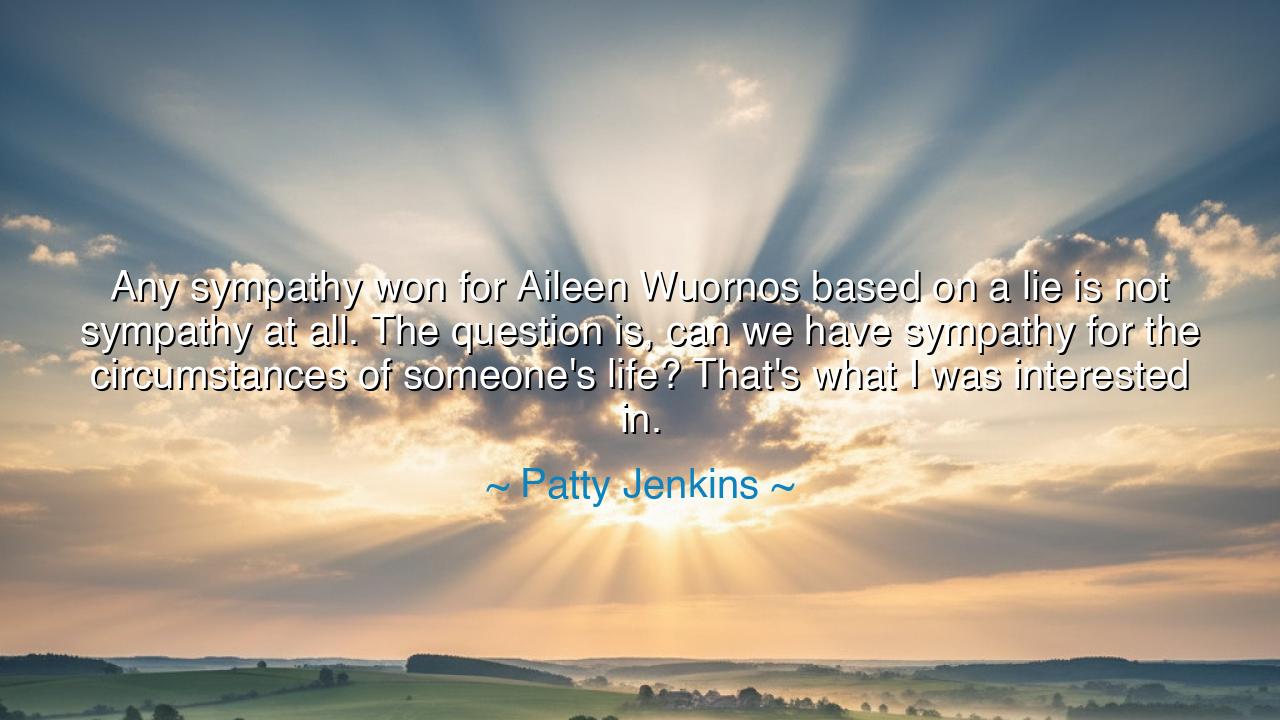
Any sympathy won for Aileen Wuornos based on a lie is not
Any sympathy won for Aileen Wuornos based on a lie is not sympathy at all. The question is, can we have sympathy for the circumstances of someone's life? That's what I was interested in.






Hear, O seekers of truth, the words of Patty Jenkins, who once dared to tell the story of a soul cast into shadow. She declared: “Any sympathy won for Aileen Wuornos based on a lie is not sympathy at all. The question is, can we have sympathy for the circumstances of someone’s life? That’s what I was interested in.” These words are not merely about a film, nor about a single life; they are about the nature of compassion itself, about how we judge, and about how we understand the darkest corners of humanity.
For Jenkins speaks of Aileen Wuornos, a woman whose name is remembered with infamy as a serial killer, yet whose life was forged in suffering, abuse, and abandonment. To cover over her truth with comforting lies would be to rob both her and the audience of authenticity. Jenkins warns us that sympathy built on falsehood is fragile, empty, and unworthy. But to look unflinchingly at the real circumstances of a broken life, and to find within that vision some thread of compassion—that is a deeper, harder, and truer act of humanity.
This distinction is ancient. Consider the trial of Socrates, condemned not for crimes of blood, but for challenging his city’s conscience. Some wished to invent noble lies to defend him, yet Socrates refused. He chose truth over false sympathy, even at the cost of death. For he knew that only truth could endure, and that compassion for a falsehood was no compassion at all. Jenkins’ words flow from this same river: only when we face reality can our sympathy hold weight.
History also offers the example of Victor Hugo’s Jean Valjean in Les Misérables, though fictional, yet rooted in truth. Valjean was branded a criminal, yet when his circumstances are revealed—stealing bread to feed the hungry—the reader’s heart is moved. This is not sympathy bought with lies, but sympathy born of understanding the forces that shape a human life. Jenkins’ interest is the same: not to excuse Wuornos’ crimes, but to ask whether we can see the whole arc of her suffering and, in that vision, recognize her humanity.
The deeper meaning of Jenkins’ reflection is this: true sympathy does not erase responsibility, nor deny justice, but it asks us to look deeper than judgment. Every life has its roots, and often those roots twist in soil poisoned by cruelty, poverty, or neglect. To ignore these circumstances is to flatten human beings into monsters or saints, when in truth they are neither—they are people, broken or uplifted by the lives they have endured. To face this truth is painful, but it is the only ground on which real compassion can stand.
The lesson, O listener, is not limited to criminals or outcasts. It is for every soul you meet. Do not allow false stories, comforting half-truths, or excuses to guide your compassion, for that sympathy will dissolve in the heat of truth. Instead, seek to understand the circumstances—the roads that led a person to who they are. This does not mean condoning every action, but it means holding fast to the belief that understanding is the first step to true justice, and that compassion grounded in truth is the only kind that endures.
Therefore, carry this wisdom into your life: when you are tempted to dismiss someone as irredeemable, pause and ask what storms have shaped them. When you are tempted to soften the truth with lies, remember that falsehood cannot nourish the soul. Offer your sympathy where it is hardest—where the truth is dark and painful—for in that place lies the greatest test of your humanity.
And thus, let Patty Jenkins’ words endure as teaching: real sympathy is not built on lies but on the courage to face truth. To understand the circumstances of a life, even a life steeped in tragedy and error, is to honor the full complexity of what it means to be human. In such understanding lies not weakness, but the immortality of compassion.






AAdministratorAdministrator
Welcome, honored guests. Please leave a comment, we will respond soon